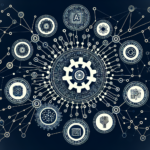Understanding Trust and Reputation in the Digital Age
The Importance of Trust
In today’s digital landscape, trust is the bedrock of any interaction, whether in online transactions, social media engagements, or collaborative projects. It helps foster relationships and bridges gaps in communication, making it essential for businesses, consumers, and networks alike. Building trust also means understanding that it’s not just about personal connections; it’s about how we perceive reliability in the systems we interact with.
Reputation Systems: A Brief Overview
At its core, a reputation system is a mechanism that collects and analyzes user feedback to assess the reliability of individuals or entities in a network. Traditional reputation systems rely heavily on centralized models, where trust is managed by centralized third-party platforms. This can lead to various challenges, including data manipulation, bias, and even breaches of privacy.
Decentralized Networks: A New Paradigm
What Are Decentralized Networks?
Decentralized networks operate on the premise that power and authority should be distributed rather than concentrated in a single entity. These networks leverage peer-to-peer connections, enabling users to possess greater control over their data and interactions. In such an ecosystem, users can interact directly, fostering transparency and reducing the risk of misinformation.
How Decentralization Enhances Trust
The decentralization of trust and reputation systems can significantly enhance user confidence. By eliminating intermediaries, decentralized networks allow for a more transparent way of building and verifying trust. This can help users to better understand who they are interacting with and reduce the risks associated with fraud and deception.
AI-Enhanced Reputation Systems
The Role of Artificial Intelligence
As decentralized networks continue to gain traction, the introduction of artificial intelligence into reputation systems is transforming the way users build trust. AI technologies can analyze vast amounts of data, identify patterns, and make predictions about user behavior, significantly enhancing the reliability of reputation assessments.
Data Analysis and Machine Learning
Through machine learning algorithms, reputation systems can automatically adapt and improve over time. These systems can learn from user interactions, rating patterns, and feedback to provide more accurate evaluations. For instance, if a user has consistently received high ratings in various transactions, the system can effectively recognize this pattern and boost their reputation score accordingly.
Behavioral Analytics
AI can also delve into behavioral analytics, assessing how users behave in different scenarios. This allows the system to identify trustworthy users beyond numerical ratings. For example, if a user engages in numerous transactions, responds promptly to inquiries, and adheres to community guidelines, their reputation can be reinforced through a nuanced understanding of their behavior and interactions.
Transforming Feedback Mechanisms
Traditional reputation systems often rely on simple rating scales, which may not accurately represent a user’s reliability. AI can help transform these feedback mechanisms into dynamic systems that capture sentiment and intent.
Sentiment Analysis
By employing natural language processing, AI can analyze user feedback to gauge sentiment. This means understanding whether a review is genuinely positive, neutral, or negative, providing a deeper and more nuanced score. Transparency in sentiment analysis can help thwart manipulative feedback and reduce the weight of spam or fraudulent ratings.
Real-time Reputation Updates
AI-enhanced systems can also deliver real-time reputation updates. This means as soon as a transaction occurs or feedback is provided, metrics can instantly adjust. This capability allows users to engage with more current and reliable reputation scores instead of relying on potentially outdated evaluations.
Challenges of AI-Enhanced Reputation Systems
Data Privacy Concerns
As reputation systems harness AI and data, privacy becomes a significant concern. Users may feel hesitant about how their information is used, raising questions about data ownership and consent. Any effective reputation system must prioritize user privacy and ensure that data is used ethically.
Algorithmic Bias
Another challenge lies in preventing algorithmic bias. AI systems are only as good as the data they are trained on, and biased datasets can lead to skewed results. Ensuring that AI algorithms are transparent, explainable, and free from biases is crucial for creating fair and accurate reputation systems.
The Future of Trust in Decentralized Networks
Innovative Approaches to Reputation Management
Going forward, we can expect to see more innovative approaches in managing trust and reputation within decentralized networks. Blockchain technology can play a vital role in creating immutable records of transactions and interactions, adding another layer of accountability.
Decentralized Identity Solutions
Emerging decentralized identity solutions allow individuals to maintain control over their information while providing verifiable credentials. This could revolutionize trust-building since users can share valid endorsements of their skills or reputations without disclosing unnecessary personal details.
Community Driven Reputation Models
There is also the potential for community-driven reputation models, where the users themselves can influence reputation systems collaboratively. This feedback-loop can encourage more authentic interactions and distribute power more evenly among users.
Blockchain and Smart Contracts
Integrating blockchain with AI-enhanced reputation systems can create smart contracts that automatically enforce trust agreements based on reputation scores. For example, in a peer-to-peer marketplace, a smart contract could ensure that payment is released only when both parties maintain their reputation scores.
Cross-Platform Reputation Systems
The future may also see cross-platform reputation systems, where user trust can be assessed across multiple decentralized applications. This can provide a holistic view of users’ reputations, leading to more informed decision-making.
Building a Trusted Ecosystem
Collaboration among Stakeholders
For decentralized reputation systems to be effective, collaboration among users, developers, and organizations is essential. Establishing standards and protocols that govern how trust is built and maintained can help ensure integrity across the ecosystem.
Education and Awareness
Raising awareness about the importance of trust and reputation in decentralized networks is crucial. As more people understand how AI-enhanced systems work, they will be better equipped to adopt and engage in these innovative platforms.
Building trust in decentralized networks through AI-enhanced reputation systems offers exciting possibilities. By addressing challenges and leveraging technology responsibly, we can create a more reliable, ethical, and transparent digital future.








